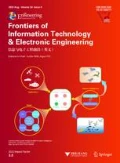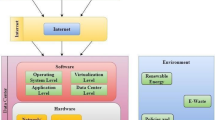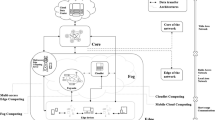Abstract
Rapidly increasing capacities, decreasing costs, and improvements in computational power, storage, and communication technologies have led to the development of many applications that carry increasingly large amounts of traffic on the global networking infrastructure. Smart devices lead to emerging technologies and play a vital role in rapid evolution. Smart devices have become a primary 24/7 need in today’s information technology world and include a wide range of supporting processing-intensive applications. Extensive use of many applications on smart devices results in increasing complexity of mobile software applications and consumption of resources at a massive level, including smart device battery power, processor, and RAM, and hinders their normal operation. Appropriate resource utilization and energy efficiency are fundamental considerations for smart devices because limited resources are sporadic and make it more difficult for users to complete their tasks. In this study we propose the model of mobile energy augmentation using cloud computing (MEACC), a new framework to address the challenges of massive power consumption and inefficient resource utilization in smart devices. MEACC efficiently filters the applications to be executed on a smart device or offloaded to the cloud. Moreover, MEACC efficiently calculates the total execution cost on both the mobile and cloud sides including communication costs for any application to be offloaded. In addition, resources are monitored before making the decision to offload the application. MEACC is a promising model for load balancing and power consumption reduction in emerging mobile computing environments.
Similar content being viewed by others
References
Calheiros RN, Ranjan R, Beloglazov A, et al., 2011. CloudSim: a toolkit for modeling and simulation of cloud computing environments and evaluation of resource provisioning algorithms. Softw Pract Exp, 41(1):23–50. https://doi.org/10.1002/spe.995
Cao HJ, Cai J, 2017. Distributed multiuser computation offloading for cloudlet-based mobile cloud computing: a game-theoretic machine learning approach. IEEE Trans Veh Technol, 67(1):752–764. https://doi.org/10.1109/TVT.2017.2740724
Chun BG, Ihm S, Maniatis P, et al., 2011. CloneCloud: elastic execution between mobile device and cloud. Proc 6th Conf on Computer Systems, p.301–314. https://doi.org/10.1145/1966445.1966473
Creeger M, 2009. CTO roundtable: cloud computing. Queue, 7(5):1. https://doi.org/10.1145/1551644.1551646
Cuervo E, Balasubramanian A, Cho DK, et al., 2010. MAUI: making smartphones last longer with code offload. Proc 8th Int Conf on Mobile Systems, Applications, and Services, p.49–62. https://doi.org/10.1145/1814433.1814441
Dinh HT, Lee C, Niyato D, et al., 2013. A survey of mobile cloud computing: architecture, applications, and approaches. Wirel Commun Mob Comput, 13(18):1587–1611. https://doi.org/10.1002/wcm.1203
Elgendy MA, Shawish A, Moussa MI, 2014. MCACC: new approach for augmenting the computing capabilities of mobile devices with cloud computing. Science and Information Conf, p.79–86. https://doi.org/10.1109/SAI.2014.6918175
Gajbhe M, Sakhare SR, 2015. Performance augmentation of mobile devices using cloud computing. Int J Comput Sci Inform Technol, 6(4):3581–3587.
Hasan R, Hossain MM, Khan R, 2015. Aura: an IoT based cloud infrastructure for localized mobile computation outsourcing. Proc 3rd IEEE Int Conf on Mobile Cloud Computing, Services, and Engineering, p.183–188. https://doi.org/10.1109/MobileCloud.2015.37
Jadad H, Touzene A, Alzeidi N, et al., 2016. Realistic offloading scheme for mobile cloud computing. Proc 13th Int Conf on Mobile Web and Intelligent Information Systems, p.81–92. https://doi.org/10.1007/978-3-319-44215-0_7
Kosta S, Aucinas A, Hui P, et al., 2012. Thinkair: dynamic resource allocation and parallel execution in the cloud for mobile code offloading. Proc IEEE INFOCOM, p.945–953. https://doi.org/10.1109/INFCOM.2012.6195845
Kovachev D, Klamma R, 2012. Framework for computation offloading in mobile cloud computing. Int Interact Multim Artif Intell, 1(7):6–15.
Liu FM, Shu P, Jin H, et al., 2013. Gearing resource-poor mobile devices with powerful clouds: architectures, challenges, and applications. IEEE Wirel Commun, 20(3): 14–22. https://doi.org/10.1109/MWC.2013.6549279
Mell P, Grance T, 2011. The NIST Definition of Cloud Computing. NIST Special Publication 800–145, NIST, Gaithersburg.
Mukherjee A, De D, 2014. A cost-effective location tracking strategy for femtocell based mobile network. Proc Int Conf on Control, Instrumentation, Energy and Communication, p.533–537. https://doi.org/10.1109/CIEC.2014.6959146
Paranjothi A, Khan MS, Nijim M, 2017. Survey on three components of mobile cloud computing: offloading, distribution and privacy. J Comput Commun, 5(6):75210. https://doi.org/10.4236/jcc.2017.56001
Robinson S, 2009. Cellphone Energy Gap: Desperately Seeking Solutions. Strategy Analytics. Technology Report, Chicago, IL, USA.
Satyanarayanan M, Bahl V, Caceres R, et al., 2009. The case for VM-based cloudlets in mobile computing. IEEE Perv Comput, 8(4):14–23. https://doi.org/10.1109/MPRV.2009.82
Sinha U, Shekhar M, 2015. Comparison of various cloud simulation tools available in cloud computing. Int J Adv Res Comput Commun Eng, 4(3):171–176. https://doi.org/10.17148/IJARCCE.2015.4342
Sookhak M, Yu FR, Khan MK, et al., 2017. Attribute-based data access control in mobile cloud computing: taxonomy and open issues. Fut Gener Comput Syst, 72:273–287. https://doi.org/10.1016/j.future.2016.08.018
Tao XY, Ota K, Dong MX, et al., 2017. Performance guaranteed computation offloading for mobile-edge cloud computing. IEEE Wirel Commun Lett, 6(6):774–777. https://doi.org/10.1109/LWC.2017.2740927
Zanni A, Yu SY, Secci S, et al., 2017. Automated offloading of Android applications for computation/energy optimizations. IEEE Conf on Computer Communications Workshops, p.990–991. https://doi.org/10.1109/INFCOMW.2017.8116525
Zhang L, Fu D, Liu JC, et al., 2017. On energy-efficient offloading in mobile cloud for real-time video applications. IEEE Trans Circ Syst Video Technol, 27(1):170–181. https://doi.org/10.1109/TCSVT.2016.2539690
Zhang Q, Cheng L, Boutaba R, 2010. Cloud computing: state-of-the-art and research challenges. J Int Serv Appl, 1(1):7–18. https://doi.org/10.1007/s13174-010-0007-6
Zhang XW, Jeong S, Kunjithapatham A, et al., 2010. Towards an elastic application model for augmenting computing capabilities of mobile platforms. Proc 3rd Int Conf on Mobile Wireless Middleware, Operating Systems, and Applications, p.161–174. https://doi.org/10.1007/978-3-642-17758-3_12
Zhou BW, Buyya R, 2018. Augmentation techniques for mobile cloud computing: a taxonomy, survey, and future directions. ACM Comput Surv, 51(1): 13. https://doi.org/10.1145/3152397
Zhou BW, Dastjerdi AV, Calheiros RN, et al., 2015. A context sensitive offloading scheme for mobile cloud computing service. IEEE 8th Int Conf on Cloud Computing, p.869–876. https://doi.org/10.1109/CLOUD.2015.119
Zissis D, Lekkas D, 2012. Addressing cloud computing security issues. Fut Gener Comput Syst, 28(3):583–592. https://doi.org/10.1016/j.future.2010.12.006
Author information
Authors and Affiliations
Contributions
Babur HAYAT guided the research on offloading mechanism using cloud computing. Zuhaib IMTIAZ and Ayesha RAANA designed the research and drafted the manuscript. Khalid ALSUBHI helped organize the manuscript. M. Usman ASHRAF helped design the data collection mechanism and edited and finalized the paper.
Corresponding author
Additional information
List of supplementary materials
Fig. S1 Total execution time on mobile device D1 (Galaxy Grand Prime)
Fig. S2 Total execution time on mobile device D2 (Google Pixel 2)
Fig. S3 Total execution time on mobile device D3 (Google Pixel 3)
Table S1 Total cloud execution costs (Hadoop simulator)
Fig. S4 Resource consumption on mobile device D1 (Galaxy Grand Prime)
Fig. S5 Resource consumption on mobile device D2 (Google Pixel 2)
Fig. S6 Resource consumption on mobile device D3 (Google Pixel 3)
Compliance with ethics guidelines
Khalid ALSUBHI, Zuhaib IMTIAZ, Ayesha RAANA, M. Usman ASHRAF, and Babur HAYAT declare that they have no conflict of interest.
Project supported by the Deanship of Scientific Research (DSR) at King Abdulaziz University, Jeddah, Saudi Arabia (No. D-154-611-1440)
Supplementary materials for
Rights and permissions
About this article
Cite this article
Alsubhi, K., Imtiaz, Z., Raana, A. et al. MEACC: an energy-efficient framework for smart devices using cloud computing systems. Front Inform Technol Electron Eng 21, 917–930 (2020). https://doi.org/10.1631/FITEE.1900198
Received:
Accepted:
Published:
Issue Date:
DOI: https://doi.org/10.1631/FITEE.1900198




